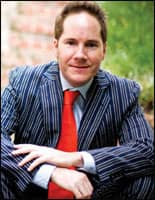by Christopher Piehler
 |
The ongoing swine flu pandemic is a powerful reminder that disruptive health crises don’t operate according to convenient schedules. The H1N1 virus began to spread as economies around the world were mired in a recession, further adding to an atmosphere of vague, pervasive menace. Would stock markets take another sickening plunge? Would more companies—or even countries—go bankrupt? Would this flu kill millions like the epidemic of 1918 did?
The most defensive reaction to all of this was to stash your money under your mattress and never leave the house without wearing a surgical mask. Frankly, if that was your choice, you were just doing what comes instinctively to Homo sapiens: Study after study has shown that people have a more negative physical reaction to the anticipation of painful events than they do to the events themselves.
For those cockeyed optimists who would prefer to earn interest on our savings and who find that surgical masks chafe after the first 5 minutes, is there a more practical approach to the current climate of ominous uncertainty? Sorting out the economy is way above my pay grade, but the flu strikes me as a simpler phenomenon.
|
You can listen to our new webcast, Flexible Financing, by clicking on the podcast tab on the homepage. |
According to the World Health Organization, the H1N1 strain of influenza has sickened more than 21,000 people and killed more than 100. Clearly, if you or someone you are close to were one of the effected 100 (or even the troubled 21,000), H1N1 has been a terrible enemy, and you have my deepest sympathies.
But for those of us who have not been personally affected, H1N1 has been an affirmation of the fact that big fears can be overcome by small actions. It is scary to think of diseases jumping from animals to people and across seas and continents, but it is empowering to know that many of these viruses can be contained by infection-control practices most of us learned from our mothers: Wash your hands, and cover your mouth when you cough or sneeze.
What is your practice doing to combat swine flu and other viruses? Please write, call, or e-mail and let me know your thoughts.
Christopher Piehler
/p>










